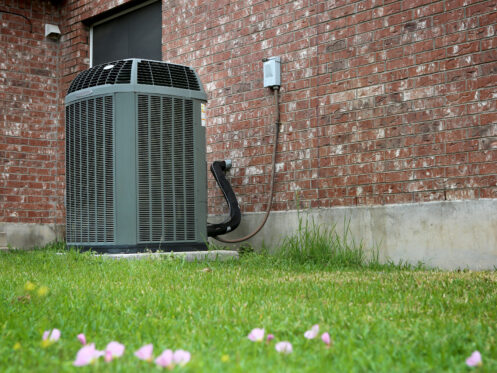During the peak of summer in Long Island, N.Y., few things can be as uncomfortable as being in your home when your air conditioning unit is not working. When the AC malfunctions, your house becomes hot, and humidity builds up. If your air conditioner is not keeping your home cool, consider the following troubleshooting tips to get it up and running again.
Look at Your Thermostat
This may seem obvious, but your air conditioning won’t cool your home if your thermostat is set to heat instead of cool. Many people forget to adjust to this setting after the winter months have passed. It’s one of the primary issues technicians encounter when customers report that their air conditioning unit isn’t working. Before moving on to more complex troubleshooting or calling a professional HVAC technician, perform this quick check to ensure your thermostat is set correctly.
Check Windows and Doors
Another troubleshooting tip that may seem obvious is to avoid leaving windows or doors open when your air conditioner is running. It’s true that on a hot day when you’re not using the air conditioner, opening doors and windows can allow cool air to circulate through the home. However, doing so while the air conditioner is running can be counterproductive. When you open windows and doors to allow warm air from outside to enter your home, your air conditioner will work harder to combat the influx of warm air and prevent it from properly cooling your home. This can cause problems over time. Ensure that everyone in the house remembers to keep windows and exterior doors closed when the air conditioner is running.
Check the Circuit Breaker
If your air conditioner is drawing more amps than the circuit breaker it’s connected to is rated for, it can trip. The circuit breaker trips to protect your home and its occupants from damage or injury caused by overcurrent. If the circuit breaker trips once, you might be able to reset it and continue using your air conditioner. However, if the circuit breaker keeps tripping, it indicates a problem with the air conditioner. Issues with electrical connections can potentially damage the air conditioner or even cause a fire.
Some common reasons your air conditioner may trip the breaker include a dirty filter, a dirty outside unit, issues with the circuit breaker, a short in the motor, problems with the compressor, or a grounded compressor. If the problem is a dirty filter, simply changing the filter may resolve the issue. However, if the problem is more complex, such as a dirty outside unit, a shorted motor, or compressor issues, it’s best to consult with your HVAC technician. They can inspect your air conditioner unit, diagnose the problem, and recommend the necessary fixes, repairs, or replacements to prevent the circuit from continuing to trip.
Checking for Low Refrigerant
If your air conditioner is low on refrigerant, it will struggle to keep your home cool. Your air conditioner does not consume refrigerant as it operates. Instead, the refrigerant cycles back and forth in a closed circuit.
Sometimes, you may hear a refrigerant leak because it produces an audible hiss. However, you’ll likely only realize that your air conditioner’s refrigerant levels are low when it takes longer to cool your home or you notice that the air coming from the vents feels warmer than it should.
Another indication of low refrigerant levels is the presence of frost or ice buildup on the evaporator coil. When refrigerant levels are low, the refrigerant becomes too cold for efficient airflow, leading to ice buildup on the evaporator coil.
If you observe water pooling around your furnace, it’s a telltale sign of a refrigerant problem. Additionally, you might notice that your air conditioner is short cycling, meaning it runs for a brief period, shuts off, and then quickly starts again. Increased electric bills can also indicate low refrigerant levels. The AC unit will struggle to maintain the desired temperature without enough refrigerant, increasing energy consumption.
Refrigerant leaks are not something homeowners can fix on their own. Refrigerant is a hazardous chemical, and your air conditioning unit operates under high pressure. Attempting to repair a refrigerant leak may void your air conditioner’s warranty and pose risks to you and your home’s occupants. If you suspect an issue with the refrigerant in your AC unit, contact an HVAC technician immediately. They have the tools and expertise to identify and address the problem safely.
Open Air Vents
Some rooms in your home, such as spare bedrooms, offices, or dens, may not be used frequently. Consequently, you may have closed the vents in these rooms, thinking it would save money on energy bills.
However, you might be surprised to learn that closing vents in different rooms can be counterproductive. For instance, you may notice increased energy bills because more conditioned air is wasted in the ductwork of your home. Closing even just a few vents increases the pressure in the ductwork, leading to more air leaks.
In extreme cases, reduced airflow caused by closed vents can cause the evaporator coil in your air conditioner to freeze over. This can lead to damage of your compressor. This happens because the evaporator coil, filled with very cold refrigerant, needs to absorb heat and moisture from inside your home. However, when vents are closed, less warm air is blown over the cold coil. This causes its temperature to drop rapidly.
If you’ve been closing vents in your home due to a sudden increase in energy bills, it could indicate that something else is wrong with your AC system. Reach out to HVAC technicians and let them determine if your air conditioner needs repair, replacement, or if a different-sized unit is required to meet your needs.
Look for Water Leaks
Your air conditioner naturally creates moisture, and it’s equipped with a condensate drain and drain pan designed to facilitate proper drainage. However, if your air conditioner is leaking into your home, this indicates a problem that needs attention. It could be due to dirty air filters blocking airflow, making it difficult for the evaporator coil to function properly. This can cause it to freeze over and then melt, resulting in excess water. Alternatively, it may be a result of incorrect installation, or a blocked condensate drain due to mold, dirt, or fungus buildup. In some cases, what appears to be water drainage issues may be a refrigerant leak, or the piping for your air conditioner may have deteriorated and started leaking.
Regardless of the cause, water leaks coupled with poor air conditioner performance should not be ignored. Contact your HVAC technician if you notice any leaks. They will inspect your air conditioner, identify the source of the leak, and provide recommendations to restore proper cooling to your home.
Keeping Long Island Comfortable Since 1976
At Cool Power LLC, we are the go-to professionals for HVAC services in Long Island. We employ NATE-certified technicians and have earned numerous awards and certifications from the EPA and the Better Business Bureau.
Our services include HVAC installation, repair, and maintenance. This includes furnace repair installation, air conditioner repair, and insulation placement. Contact Cool Power LLC today to schedule an appointment.


